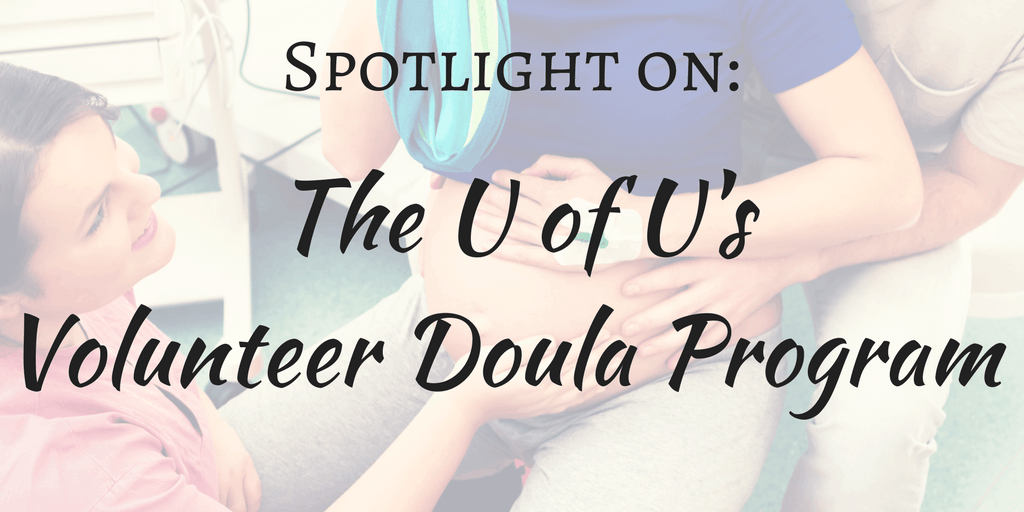Spotlight on: The University of Utah’s Volunteer Doula Program
By guest blogger Sheri Rysdam
Learning More About the University of Utah’s Volunteer Doula Program
In the spring of 2013, I took Kristi Ridd-Young’s three-day doula training workshop, which inspired me to start supporting women in labor. However, I knew it would never be full-time work for me. So, after learning about the University of Utah’s Volunteer Doula program, which was just getting started at the time, I got involved.
To volunteer for the program, doulas need a basic doula training (either from the U of U’s Volunteer Doula training directly or from another reputable outlet). New volunteers also have to be approved through the U of U’s Volunteer Services Program, which encompasses the doula program and many other volunteer programs throughout the hospital, more onboarding trainings, paperwork, an update on a few crucial vaccines, and an orientation in Labor and Delivery. After going through these steps, I began volunteering twice monthly—sometimes more.
The volunteer program was a great way for me to gain experience as a doula (during times that worked for me) and to help support women who otherwise would not be able to have a doula.
What the Program Is, and What it is Not
What It Is
- It’s a great resource for women who otherwise would not be able to have a doula. While the intention is to help support those women who don’t know about doulas, don’t have labor support, and/or would are not able to pay for a doula, any woman laboring at the U of U hospital can request a doula if one is available.
- It’s a great learning opportunity for new doulas to gain experience. The doula volunteers at the U range from some of our most experienced doulas working in Utah to brand new volunteers who don’t know much about childbirth or doula work (but are quickly learning!)
- It’s a program that helps empower new mothers who may not even know that doulas exist. Young and single women are often offered doula support. Doulas then can help support these women in listening to their bodies, making choices that work best for them, and giving birth in a way that feels best to them. I’m convinced that this support can be life changing for some women, especially those who previously have had very little choice or support in their lives.
What It Isn’t
- It isn’t a substitute for hiring your own doula. If you know you want a doula, you should hire a doula. While the volunteer doula program at the U has a doula on call or scheduled for many shifts throughout a month, there are plenty of times that are not covered. There is no guarantee that a volunteer doula will be able to come to the hospital when you go into labor. Another common scenario is that the volunteer doula is unavailable because she is working with another woman who is in labor.
- It isn’t a guarantee your assigned doula will be a good match for you. Since you cannot choose your doula in advance, it’s possible that the volunteer doula who happens to be on call will be a wonderful, loving match (in my experience, most doulas are), however, it is possible that the on call doula is not a great match for you. Your personalities might clash, or you might get a weird vibe, or any other tangible or intangible aspect of the human relationship could make the connection great, or…not so great. (You can always ask the doula to leave if you no longer want her support.)
- It isn’t a guarantee that you’ll have an experienced doula. While it’s true that every volunteer doula has some basic training, you never know how much experience your volunteer doula might have. She could be on her first shift and yours could be the first birth she’s ever attended. Or, you could get connected to an experienced doula. Experience levels in the volunteer doula program vary widely.
The University of Utah Volunteer Doula Program can be contacted at uofudoulas@gmail.com, and questions can be sent to that email address, as well.

Sheri Rysdam teaches college writing and yoga. Her scholarship is rhetoric, including feminist medical rhetorics. She works as a doula in the Salt Lake City area, where she focuses on supporting young women with limited financial resources. She writes at www.sherewin.com.

